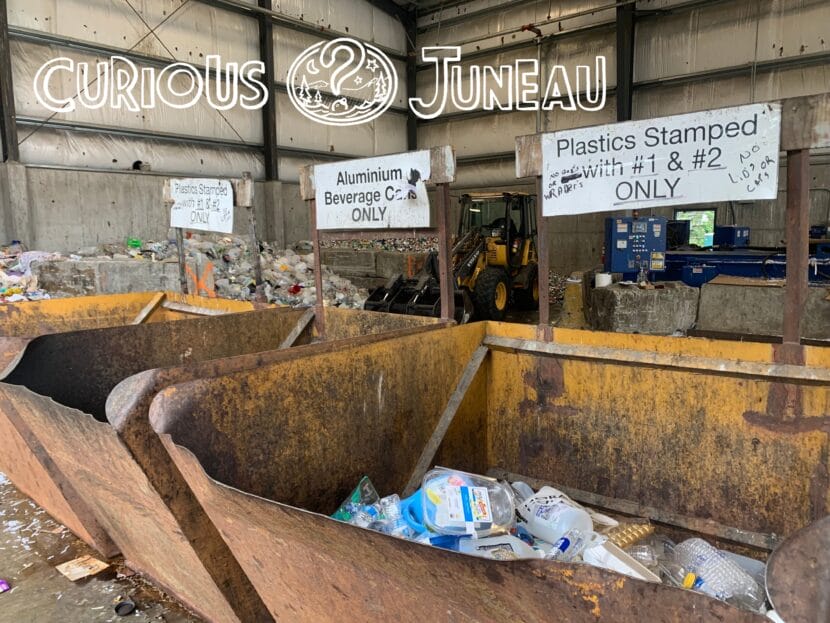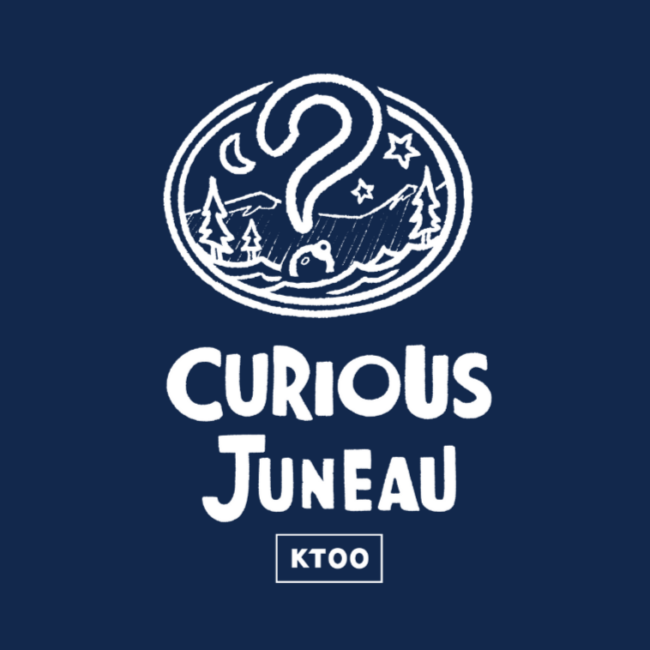Ga offline met de app Player FM !
How well does Juneau recycle, and where does it all end up?
Manage episode 413247764 series 1457379

Editor’s Note: After we finished this story, a power outage forced the city’s recycling center to close for repairs. The city’s public works department says the recycling facility is full right now and won’t be able to receive any new materials for at least a few days.
It’s a nearly universal experience in Juneau.
It’s Saturday. You pull up to the city recycling center in Lemon Creek and methodically separate the Number 1 and 2 plastics, tin, glass, aluminum and cardboard you’ve used over the past week into their separate piles. Then you get back in your car to finish your weekend errands, which probably include Costco.

But do you ever stop to wonder what happens to all of that material after you drop it off?
Over the years, several Curious Juneau listeners have asked where Juneau’s recycling ends up. A few even wonder if it’s really getting reused, or if some of it ends up in a landfill.
And what about contamination – can incorrectly separating recyclables cause Juneau’s shipments to be rejected?
“Our stuff is considered the gold standard,” said Juneau Recycleworks Operations Manager Stuart Ashton. “They will actually take it and if they’ve got a tour coming up, they’ll bring that stuff out and for observation because it’s so good. It’s that good.”
Where does it all go?
Ashton is talking about the staff of a big recycling facility in Tacoma, Washington. That’s the short answer. Your recycling goes to Tacoma.
Separated recycling gets condensed into cubes by a baler, then it’s shipped by barge to Waste Management’s JMK Fibers recycling facility.
They process about 180,000 tons of material per year. Ashton said Juneau makes up about 1,400 tons of that.
Jackie Lang with Waste Management’s Northwest region said while there’s always room for improvement, Juneau’s reputation for good recycling outshines many of the other communities they serve.
“They are pretty darn good at it,” Lang said. “We see that in the material that we receive from Juneau. We see that residents and businesses are working hard to put the right material in the right container.”
In Tacoma, industrial-scale machines sort Juneau’s recycling before it gets shipped to end markets.
“Plastics sorted at this particular recycling facility end up in fleece-type clothing and backpacks,” Lang said. “Some plastics are made into rigid plastic products like plastic buckets or maybe laundry baskets or storage bins. Tin cans are recycled into rebar, aluminum cans become new aluminum cans. And cardboard boxes become new boxes, water bottles become new water bottles.”
Does recycling make a difference?
National headlines in recent years have bemoaned the unsavory realities of recycling, like the fact that only a tiny portion of what gets put in recycling bins worldwide actually ends up being reused.
Lang said the commodity market for recycled materials fluctuates constantly based on global supply and demand. She acknowledged that the market had dipped in recent months, but said that Waste Management has recently invested millions into improving equipment at its Tacoma facility to make sure more of what they receive does get recycled.
“Recyclables that arrive at our recycling center are sorted and shipped to manufacturers who are waiting for that material,” she said. “So the demand is reliable and steady for the products that we recycle every day.”
More and more, headlines and studies warn us about the threat of microplastics in our environment, even here in Alaska.
Recycling has long been touted as the way to avoid plastics pollution. But a recent report from the Center for Climate Integrity investigates how the oil and plastics industries used recycling as a public relations tool for decades, despite privately acknowledging that recycling often costs more than producing new plastics.
The report accuses corporations of suppressing this information, leading to the rise in global plastic pollution.
How can Juneau resident be better recyclers?
Back in Juneau, there’s still the question of what to do with those pesky items that don’t have a proper bin.
Juneau’s curbside recycling program is done through Alaska Waste, which accepts plastics 1 through 7.
Ashton says the city’s recycling facility only accepts #1 and #2 plastics. He noted that #5 has become more valuable on the market, but it’s not as simple as suddenly deciding to accept it.
“It really is more about sustainable practices,” he said. “Trying to retrain an entire population of 30,000 people, you can only take number one and two plastics for two decades and then switch. If it gets more expensive, we have to stop it in a couple of years.”
Another thing to keep in mind is that if the plastic caps and lids don’t have a recycling stamp with a 1 or 2 on them, they’re not allowed. And plastic bags? They’re never recyclable, although Fred Meyer sometimes collects used bags.
Nearly all of the recycling collected curbside and at the city facility eventually leaves town. But not all of it. Waste Management actually grinds up glass at the dump. Ashton says the landfill uses it in place of gravel.
“It is our best reuse material in this town, from my perspective,” Ashton said.
So where could Juneauites improve their recycling habits? Ashton says the curbside recycling program sees the most contamination. That’s probably because there’s less oversight — and less social pressure to get it right.
Curious Juneau
Are you curious about Juneau, its history, places and people? Or if you just like to ask questions, then ask away!
- What do you want to know about Juneau?
- Name*First Last
- Email*
- Phone
- Zip Code ZIP / Postal Code
- CAPTCHA
20 afleveringen
Manage episode 413247764 series 1457379

Editor’s Note: After we finished this story, a power outage forced the city’s recycling center to close for repairs. The city’s public works department says the recycling facility is full right now and won’t be able to receive any new materials for at least a few days.
It’s a nearly universal experience in Juneau.
It’s Saturday. You pull up to the city recycling center in Lemon Creek and methodically separate the Number 1 and 2 plastics, tin, glass, aluminum and cardboard you’ve used over the past week into their separate piles. Then you get back in your car to finish your weekend errands, which probably include Costco.

But do you ever stop to wonder what happens to all of that material after you drop it off?
Over the years, several Curious Juneau listeners have asked where Juneau’s recycling ends up. A few even wonder if it’s really getting reused, or if some of it ends up in a landfill.
And what about contamination – can incorrectly separating recyclables cause Juneau’s shipments to be rejected?
“Our stuff is considered the gold standard,” said Juneau Recycleworks Operations Manager Stuart Ashton. “They will actually take it and if they’ve got a tour coming up, they’ll bring that stuff out and for observation because it’s so good. It’s that good.”
Where does it all go?
Ashton is talking about the staff of a big recycling facility in Tacoma, Washington. That’s the short answer. Your recycling goes to Tacoma.
Separated recycling gets condensed into cubes by a baler, then it’s shipped by barge to Waste Management’s JMK Fibers recycling facility.
They process about 180,000 tons of material per year. Ashton said Juneau makes up about 1,400 tons of that.
Jackie Lang with Waste Management’s Northwest region said while there’s always room for improvement, Juneau’s reputation for good recycling outshines many of the other communities they serve.
“They are pretty darn good at it,” Lang said. “We see that in the material that we receive from Juneau. We see that residents and businesses are working hard to put the right material in the right container.”
In Tacoma, industrial-scale machines sort Juneau’s recycling before it gets shipped to end markets.
“Plastics sorted at this particular recycling facility end up in fleece-type clothing and backpacks,” Lang said. “Some plastics are made into rigid plastic products like plastic buckets or maybe laundry baskets or storage bins. Tin cans are recycled into rebar, aluminum cans become new aluminum cans. And cardboard boxes become new boxes, water bottles become new water bottles.”
Does recycling make a difference?
National headlines in recent years have bemoaned the unsavory realities of recycling, like the fact that only a tiny portion of what gets put in recycling bins worldwide actually ends up being reused.
Lang said the commodity market for recycled materials fluctuates constantly based on global supply and demand. She acknowledged that the market had dipped in recent months, but said that Waste Management has recently invested millions into improving equipment at its Tacoma facility to make sure more of what they receive does get recycled.
“Recyclables that arrive at our recycling center are sorted and shipped to manufacturers who are waiting for that material,” she said. “So the demand is reliable and steady for the products that we recycle every day.”
More and more, headlines and studies warn us about the threat of microplastics in our environment, even here in Alaska.
Recycling has long been touted as the way to avoid plastics pollution. But a recent report from the Center for Climate Integrity investigates how the oil and plastics industries used recycling as a public relations tool for decades, despite privately acknowledging that recycling often costs more than producing new plastics.
The report accuses corporations of suppressing this information, leading to the rise in global plastic pollution.
How can Juneau resident be better recyclers?
Back in Juneau, there’s still the question of what to do with those pesky items that don’t have a proper bin.
Juneau’s curbside recycling program is done through Alaska Waste, which accepts plastics 1 through 7.
Ashton says the city’s recycling facility only accepts #1 and #2 plastics. He noted that #5 has become more valuable on the market, but it’s not as simple as suddenly deciding to accept it.
“It really is more about sustainable practices,” he said. “Trying to retrain an entire population of 30,000 people, you can only take number one and two plastics for two decades and then switch. If it gets more expensive, we have to stop it in a couple of years.”
Another thing to keep in mind is that if the plastic caps and lids don’t have a recycling stamp with a 1 or 2 on them, they’re not allowed. And plastic bags? They’re never recyclable, although Fred Meyer sometimes collects used bags.
Nearly all of the recycling collected curbside and at the city facility eventually leaves town. But not all of it. Waste Management actually grinds up glass at the dump. Ashton says the landfill uses it in place of gravel.
“It is our best reuse material in this town, from my perspective,” Ashton said.
So where could Juneauites improve their recycling habits? Ashton says the curbside recycling program sees the most contamination. That’s probably because there’s less oversight — and less social pressure to get it right.
Curious Juneau
Are you curious about Juneau, its history, places and people? Or if you just like to ask questions, then ask away!
- What do you want to know about Juneau?
- Name*First Last
- Email*
- Phone
- Zip Code ZIP / Postal Code
- CAPTCHA
20 afleveringen
Wszystkie odcinki
×Welkom op Player FM!
Player FM scant het web op podcasts van hoge kwaliteit waarvan u nu kunt genieten. Het is de beste podcast-app en werkt op Android, iPhone en internet. Aanmelden om abonnementen op verschillende apparaten te synchroniseren.




